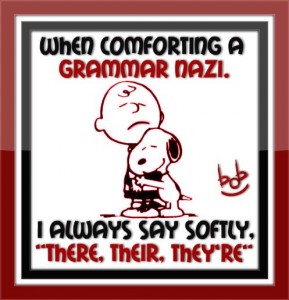22 Oct
2016
Another Look at These Frequently Confused Words…
It may be time to take another look at these frequently confused words. Working on editing and proofreading, we naturally spot many of these on a daily basis; this is by no means an exhaustive list but it does cover those that occur most frequently. Below are the first five – check back next week for another five!
- You’re/your
I blame social media for this one – there’s the temptation to throw spelling and grammar out of the window in the pursuit of haste!
You’re is the contracted form of ‘you are’.
Your is a possessive pronoun meaning something that belongs to you.
If you don’t bother with correct grammar in your formal writing you’re not going to make a good impression.
2. They’re/their/there
As above – they’re is the contracted form of they are. Their is a possessive pronoun that means something belonging to them. And there? There refers to a place (consider – as a reminder – that it contains the word ‘here’).
If they’re looking for their coats, they should know that they left them over there.
3. Less/fewer
Less is used for non-count nouns: less flour, less money, less rain/snow, less information, etc.
If something can be counted individually, use fewer: fewer people, fewer books, fewer schools, fewer trees, etc.
Be careful, though; if you have less coffee in your cupboard than tea, you might want to drink fewer cups of coffee in a day.
4. Compliment/complement
A compliment is something nice you say to someone:
Sally paid me a lovely compliment on my new hairstyle.
Complement, on the other hand, means to complete something (or be an excellent accompaniment).
That sauce perfectly complements the meal. OR
The mosaic backsplash was the perfect complement to my new countertops.
5. Lose/loose
If you can’t find something then you lose it.
If your clothes are too big they may be loose on you.
Be careful, if your necklace is too loose, you may lose it!




